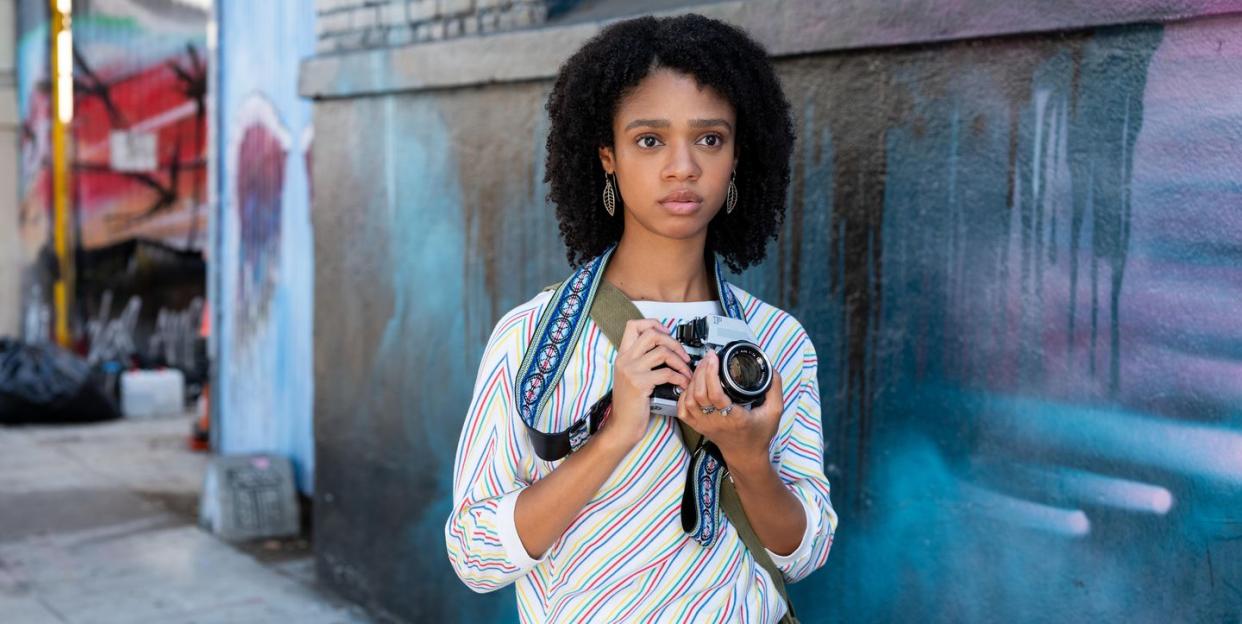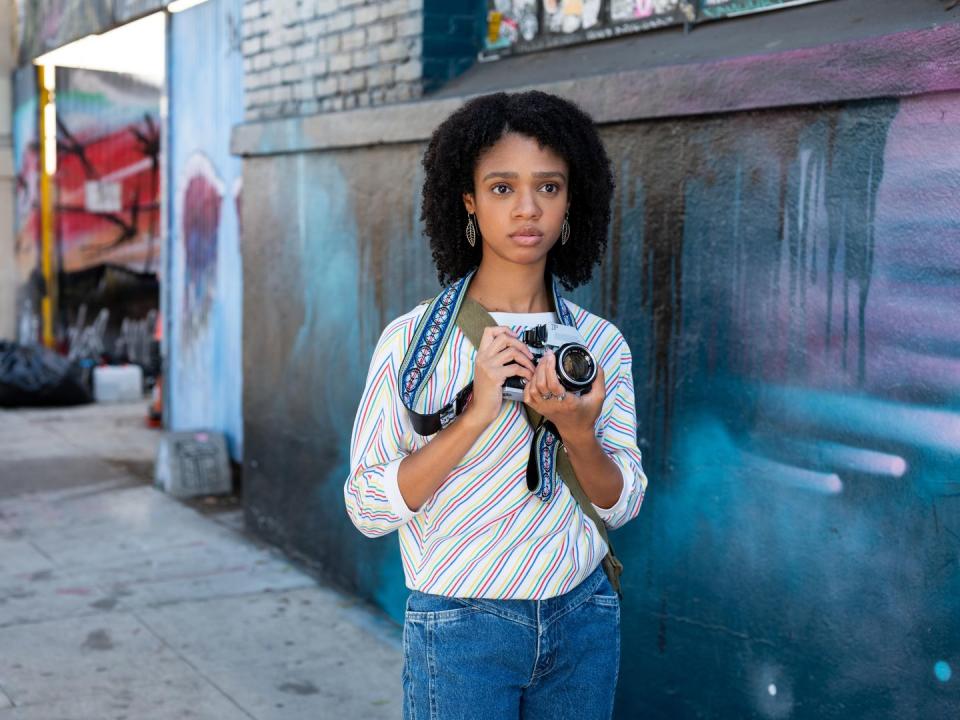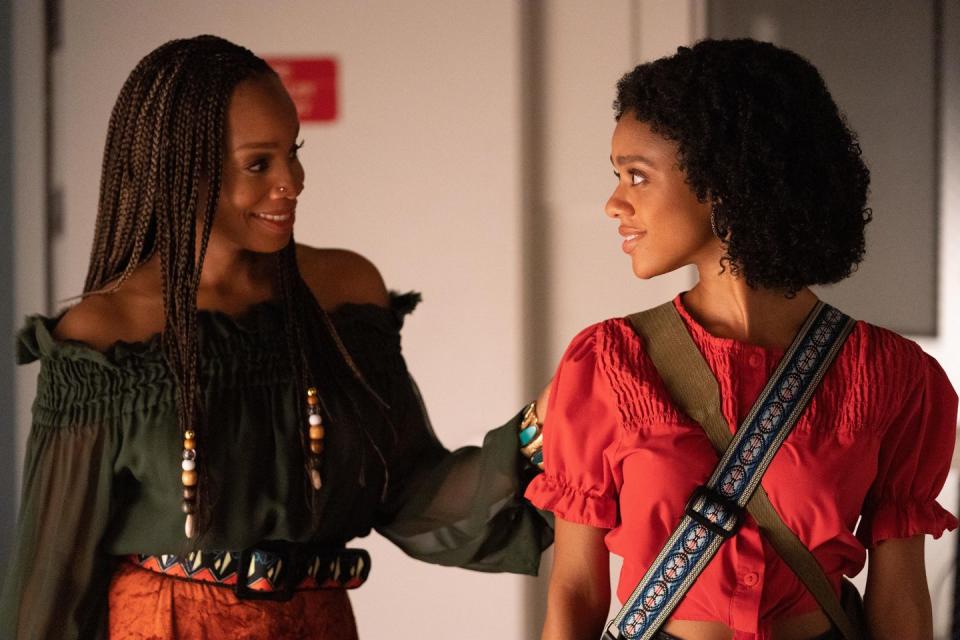Tiffany Boone Is the Breakout Star of 'Little Fires Everywhere'

Spoilers for Little Fires Everywhere episode 6 and season 1 of Hunters below.
If you've been anywhere near Twitter since Wednesday's episode of Little Fires Everywhere dropped, it was impossible to ignore—not that you'd want to. The effusive praise for Tiffany Boone, who commands every frame as a younger version of Kerry Washington's Mia Warren in the Hulu limited series, was overwhelming and well deserved.
Episode 6, "The Uncanny," is the turning point of Little Fires Everywhere, the episode that casts all of adult Mia's questionable decisions and eccentricities into stark relief with a single truth: Pearl (Lexi Underwood) is a surrogate baby Mia carried for a New York couple who couldn't conceive. She's Mia's biological daughter, yes, but her father Joe (Jesse Williams) and his wife (Nicole Beharie) paid the struggling art student to conceive—via turkey baster, no less. But near the end of Mia's pregnancy, her beloved brother Warren (Aubrey Joseph) and her art professor and lover Pauline Hawthorne (Anika Noni Rose) died within weeks of each other, and a grieving Mia packed up her New York life to hit the road for, well, forever. She's been running with Pearl since her birth, and she hasn't looked back since.
It's a lot to take on. Every second Boone appears onscreen is packed with exposition, a challenge without the pressure of taking up the mantle of an Emmy nominee. But Boone's performance is like a download of Washington's muscle memory. Each movement, from the set of her jaw to the cock of her eyebrow, is identical, and t's nothing short of extraordinary. Boone, fresh off a standout performance in Amazon's Hunters, caught up with ELLE.com to discuss her study of Washington, advice from George Clooney, and shattering stereotypes of motherhood.

Your facial expressions are exactly like Kerry’s, right down to the set of your jaw.
I was able to come to set whenever she was filming. They gave me free rein over that, and I would pick certain scenes I felt I really needed to see her work on. I wrote notes and paid close attention to the way her body moved—the way her head tilted, the way she listened, all of that. Kerry's such a specific actress, which was really a gift to me. I wanted to make sure I was getting the essence of her and her body, not mimicking or doing an impression of her.
What beats were most important for you to hit with young Mia?
It was really important to show a side of her before the world damaged her, before these circumstances sent her to this place. [The audience] has to see softness and vulnerability and optimism and joy in her. She's very hardened by the time you see her in the '90s. All the things she's gone through have strengthened her, but make her really difficult to connect with for a lot of the characters. There's a reason she's so protective over her daughter, but at one time, she was as bright-eyed and bushy-tailed as Pearl is.
You had the very specific challenge of conveying these characters within a finite period of time. How did you approach that?
Her relationship with Pauline is incredibly important. You don't see [adult] Mia loving anyone other than her daughter, so [the audience] has to see that level of love, to see her fall in love and open up to her sexuality. And her brother is so important to her, [so I had to] make sure those relationships were really clear, that you felt the love she had for them. Their losses inform who she becomes later. I worked a lot with the actors who played them to make sure our connection was there and made you feel for her.

How did you do that?
It was so easy with us. Anika Noni Rose got cast the day before she started shooting. I had never met her before and I was a fan—I'd seen her on Broadway in Caroline, or Change when I was in high school. She's such an open person, and she's so giving as an actress. She was interested in my process playing Kerry, so in a way, it's that same mentor dynamic. We trusted each other.
Aubrey and I had a blast together. The moment I saw him [for the first time], he walked in to do a fitting and had five layers of diamond necklaces around his neck. I was like, "This is the coolest kid.” I can't express the immediacy of our connection. It was easy to fall in love with both of them.
What will you say the actor playing a young version of you in a few years?
The same advice that Kerry gave me: Make it your own. This is your artwork. You can't feel like you're trying to live up to someone else or do what someone else can do. You're hired because of what you can do and what you bring to the role, so believe in that.
90’s Mia & 80’s Mia (and Pearl😂) ⠀⠀⠀⠀⠀⠀⠀⠀⠀ I looooooooooove this episode so much!!!!
A post shared by Kerry Washington (@kerrywashington) on Apr 8, 2020 at 9:56am PDT
Kerry also executive-produced Little Fires—did working with her on this make you want to explore that side of the industry?
I walked onto set the first day I came to observe, and it was a video village full of women. You can tell from the first moment, it's not just so they can say, "women are here." It's not to fill a quota. Each one of those women are amazing at their job. They are dedicated to the project and they know exactly what they're talking about. Then after [Little Fires], I went to work on a film George Clooney is directing [The Midnight Sky]. He started his own production company years ago. He literally looked at me and was like, "Tiff, you need to do this while you're young. You need to get started on your own production company now. I feel like I started too late. Just do it." If you can have someone as amazing as George Clooney saying, "You can do it," how can I say it's not possible?
How did you react to that big Hunters twist with Al Pacino's character, Meyer Offerman?
Logan told me like halfway through, and he'd known from the beginning. Obviously Al knew, but the rest of us didn't. We kept trying to guess what it was. We knew Al probably wasn't going to do more than one season of a television show. It's Al Pacino. But we didn't know what direction it was going in. And when Logan told me, I stopped eating. I was looking around with my mouth open, and he kept talking about other things. And I kept going, "Logan, are you serious? Are you joking? Are you sure?" Then, just like the audience does, I start going back over all the things we've shot and everything I've read and go, "Well, that does make sense," and putting all the pieces together. They did such a wonderful job of giving you little nuggets.
You've discussed how important it was for you to play a mom in Hunters, and now you're doing it again in Little Fires. Are you consciously gravitating to these roles?
I'm very close to my mother, and I do think mothers, especially single mothers, are superheroes. The amount of things they have to accomplish with very little resources or support is amazing. To be able to play two strong, black, single mothers who are also smart and dedicated to their work and sexually free—all those things are so interesting to me. You're [often] seeing mothers as one dimensional. Their whole life is their kids, and you don't get to see the other parts of them. That's what’s great about both of these roles: Yes, they're mothers, and that's part of their strength. But they have so much else going on for them. hey're fully realized characters.
You Might Also Like

 Yahoo News
Yahoo News 
